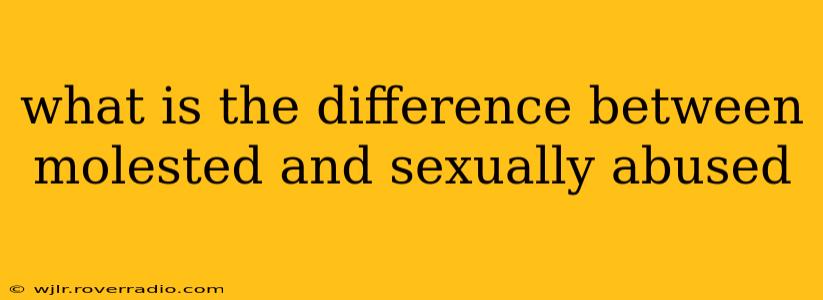What is the Difference Between Molested and Sexually Abused?
The terms "molested" and "sexually abused" are often used interchangeably, leading to confusion. While they are closely related and frequently overlap, there are subtle but important distinctions. Understanding these differences is crucial for accurate communication, effective support for survivors, and legal clarity.
In essence, molestation is a type of sexual abuse. Sexual abuse encompasses a broader range of harmful sexual acts, while molestation typically refers to a specific kind of sexual abuse, often involving inappropriate touching.
Let's break down the nuances:
What is Sexual Abuse?
Sexual abuse is a broad term encompassing any sexual act without consent. This includes, but is not limited to:
- Non-contact abuse: This can involve things like exposure, voyeurism (watching someone without their knowledge or consent), sexual harassment, or the sharing of inappropriate sexual images or content.
- Contact abuse: This involves physical contact of a sexual nature without consent, such as rape, sexual assault, or any unwanted touching of a sexual nature.
- Exploitation: This covers situations where someone is coerced or manipulated into sexual acts, such as child sex trafficking or online exploitation.
Sexual abuse can occur across a spectrum of relationships – between strangers, acquaintances, family members, or individuals in positions of power. The severity and long-term impact vary greatly depending on factors like the nature of the abuse, the age and vulnerability of the victim, and the duration of the abuse.
What is Molestation?
Molestation typically refers to the non-consensual touching of a child's genitals or other private body parts, often for the sexual gratification of the abuser. It's a form of sexual abuse that focuses on the physical act of inappropriate touching. While molestation often involves children, it can occur with adults as well. However, the term is more frequently used in the context of child abuse.
Key Differences Summarized:
| Feature | Sexual Abuse | Molestation |
|---|---|---|
| Scope | Broad term encompassing various sexual acts | Specific type of sexual abuse involving touching |
| Focus | Consent, exploitation, and harm | Non-consensual touching of private body parts |
| Contact | Can be contact or non-contact | Primarily contact abuse |
| Victims | Can be of any age | Often, but not always, children |
Are there situations where the terms are used interchangeably?
Yes, often in casual conversation, or even in some media reports, the terms are used interchangeably. This doesn't necessarily diminish the severity of the abuse; it simply reflects a lack of precise language. However, for legal purposes and in formal settings, it's important to distinguish between the two to ensure accuracy and to adequately reflect the specific nature of the offense.
What if I'm unsure about which term to use?
If you are unsure, it is always safer and more accurate to use the broader term "sexual abuse." This encompasses a wider range of experiences and avoids potential misinterpretations or minimization of the harm inflicted.
It's vital to remember that both molestation and sexual abuse are serious crimes with devastating long-term consequences for victims. If you or someone you know has experienced sexual abuse, please seek help from a qualified professional or support organization. There are resources available to provide support, guidance, and justice.
